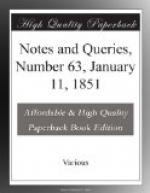“Habebit (vicarius)
cum eis victum suum competentem, et ad vestes sibi
emendas XL. solidos Andegavenses,
et Denarium singulis diebus
Dominicis ecclesiastica consuetudine
offerendum.”
On this extract from a charter he observes:
“Erat itaque Denarius de Palma, ille qui singulis Diebus Dominicis et [lege a] fidelibus offerrebatur. Cur autem dictus ‘de Palma’ non constat, nisi forte sic dictus fuerit quod in manum seu palmam traderetur.” Denarius Dominicalis, idem.—Arest. MS. a. 1407.
It would seem also from his definition to be the same as the payment called “Denaria Sacramentorum,” that is:
“iidem denarii qui singulis offerrebantur Dominicis, ideoque Sacramentorum dicti, quod tempore Sacrosancti Missae Sacrificii, pro excellentia interdum nude appellati Sacramentum, a fidelibus offerrentur.”—Annal. Bened., t. iv. p. 466., n. 80. ad annum 1045.
These extracts sufficiently explain, perhaps, the payment known by the different names of “Dominicals,” “Palm-penny,” and “Sacrament-pence;” and still indicated, probably, by the weekly offertory of our communion service.
Of a kindred nature were the “Denarii pro Requestis,” or “Denarii perquisiti,” sometimes also {26} called “Denarii memoriales,” pence paid for masses in memory of the dead: called “pro requestis,” because they were obtained by special petition [requesta] from the curate; and “perquisiti,” “perquisite pence,” because they were demanded [perquirebantur] from the devotion of the parishioners, over and above the customary offerings. And in this, perhaps, we find the origin of our word “perquisite.” (Lyndw. Prov. p. 111., notes c, e. and p. 237.)
In further illustration of this subject, I will quote the following note from Mr. Dansey’s learned work Horae Decanicae Rurales, vol. i., p. 426., ed. 1844, which refers also to Blomefield’s Norfolk, vol. iv. p. 63.:
“A.D. 1686. The dean of the deanery of the city of Norwich was committed to custody, on one occasion, by the itinerant justices, for exacting hallidays toll by his sub-dean in too high a manner; but on his proving that he took of every great boat that came up to the city on a holiday 1d. only, and of each small one a halfpenny; of every cart 1d., and of every horse or man laden an halfpenny; and of all bakers, butchers, and fishmongers, that sold their commodities on a holiday, 1d. each; and that his predecessors always had immemorially taken it, he was discharged.—Something of the same kind is related, in T. Martin’s MS. history, respecting the dues exacted by the rural dean of Thetford. Dr. Sutton’s MS. Letter.”
E.A.D.
* * * * *
MEDAL STRUCK BY CHARLES XII.—RUDBECK’S ATLANTICA.
Although no numismatist, yet, being resident at Stockholm, I have taken steps to enable me to reply to L.’s Query (Vol. ii., p. 408. of “NOTES AND QUERIES”) respecting Charles XII.’s medal in commemoration of the victory at Holowzin.




